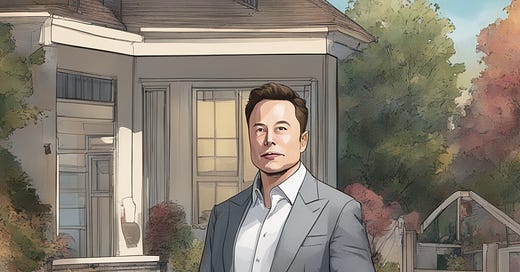If you live in Austin as I have for the past 17 years, the phrase “new Austin” is pretty self-explanatory. Over the past few decades, the population of Austin has exploded, going from about 340,000 in 1980 to just shy of a million today, and that's actually a little bit of an understatement. That's just Austin proper rather than the whole metro area.
With that growth has come a comparably dramatic shift in the city's culture. What was once a relatively low key college town with a great music scene and a strong hippie vibe has become a tech yuppy wonderland, for good and ill. Austin used to be weird and didn't have to think or talk about it. Then there was a period when it was visibly losing its weirdness, and we would say, "Keep Austin Weird," and that meant something meaningful. Now no one even says that anymore. We're dynamic and fascinating and great in many ways, but we're not weird, and we're even less weird every day.
The building of Tesla's white, gleaming, vast and futuristic gigafactory is about as heavy-handed a symbol of this change as you can get. Construction began in the summer of 2020. The factory started producing cars in late 2021, and it had its official launch party, which had been delayed because of Covid, in April of 2022.
And the Gigafactory isn't, in a sense, just the Gigafactory, it's the centerpiece and symbol of Elon Musk's whole empire, much of which has either relocated to or expanded into the Austin area over the past few years. So the Boring Company, which is his tunnel building endeavor, is now headquartered in Pflugerville outside the city. Neuralink, which I'm pretty sure is his mind control company, is building a big space in Dell Valley. SpaceX is building a facility in Bastrop and Tesla already has plans in the works to expand the Gigafactory, which at present has a floor area of about 10 million square feet, by another million or so square feet.
So what does all of this mean for Austin? Other than to say it's new Austin versus old Austin. To help answer that question, I have Randy Lewis and Craig Campbell. Randy is the chair of the American Studies Department at UT Austin and the author of many books, many of them on film. He is also the founder and creative spirit behind the End of Austin, an online project dedicated to the change in Austin. Craig Campbell is an associate professor of anthropology, a scholar of visual culture and the Soviet Union, among other things, and one of the guiding spirits of the dystopian named Bureau for Experimental Ethnography. And Randy and Craig are here in particular because they're also collaborators on a new project that is focused on the Tesla Gigafactories in Austin and in Germany.
Our Neighbor Elon and His Big Giga
Understanding what Giga Texas means for the evolution of Austin and the future of America's cities.
Sep 19, 2023
Eminent Americans
Eminent Americans is a podcast about the writers and public intellectuals who either are key players in the American intellectual scene or who typify an important aspect of it. It also touches on broader themes and trends in the discourse.
Eminent Americans is a podcast about the writers and public intellectuals who either are key players in the American intellectual scene or who typify an important aspect of it. It also touches on broader themes and trends in the discourse. Listen on
Substack App
Spotify
RSS Feed
Recent Episodes














Share this post